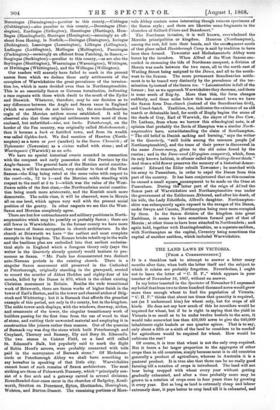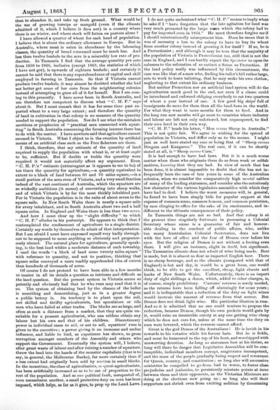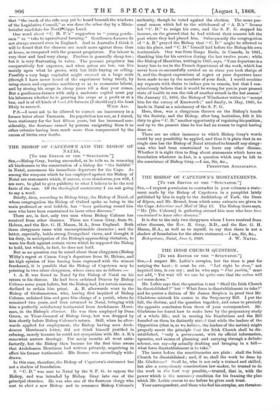THE LAND LAWS IN VICTORIA.
[FROM A CORRESPONDENT.] IT is a thankless task to attempt to answer a letter many months after date, when both the letter itself and the subject to which it relates are probably forgotten. Nevertheless, I ought not to leave the letter of "C. H. P.," which appears in your- number of November 16, 1867, without an answer.
In my letter inserted in the Spectator of November 91 expressed my belief that from two to three hundred thousand acres would grow more than enough wheat to feed the population of Victoria. "C. H. P." thinks that about ten times that quantity is required, not (as I understand him) for wheat only, but for crops of all kinds. Ile does not say how much of this he considers would be required for wheat, but if he is right in saying that the yield in Victoria is so small as to be under twelve bushels to the acre, it would take somewhat less than 450,000 acres to give the 640,000 inhabitants eight bushels or one quarter apiece. That is to say, only about a fifth or a sixth of the land he considers to be needed for agriculture would be required for wheat. How would he cultivate the rest?
Of course, it is true that wheat is not the only crop required But it bears a far larger proportion to the aggregate of other crops than in old countries, simply because meat is in old countries generally a product of agriculture, whereas in Australia it is a pastoral product. It is true also that there can be no really good farming till a rotation of crops is introduced. The land will not bear being cropped with wheat every year without getting gradually exhausted, and after a time probably more may be grown in a rotation of crops once in four years than by growing it every year. But as long as land is extremely cheap and labour extremely dear, it pays better to crop land till it is exhausted, and
then to abandon it, and take up fresh ground. What would be the use of growing turnips or mangold (even if the climate admitted of it, which I believe it does not) in a country where there is no winter, and where stock will fatten on pasture alone ?
I have allowed a quarter of wheat for each head of population. I believe that is about the ordinary allowance in Europe. But in Australia, where meat is eaten in abundance by the labouring classes, the quantity of bread consumed must be much less. And lees than twelve bushels to the acre is a miserably low rate of pro- duction. In Tasmania I find that the average quantity per acre from 1858 to 1866, inclusive (except 1863, the statistics of which I have not got), is upwards of eighteen bushels; and certainly it cannot be said that there is any superabundance of capital and skill employed in farming in Tasmania. So that if Victoria cannot produce twelve bushels, it may almost be doubted whether she had not better get some of her corn from the neighbouring colonies instead of attempting to grow all of it for herself. But I am com- ing to this presently. I have never been in South Australia, and am therefore not competent to discuss what "C. H. P." says about it. But I must remark that it has for some time past ex- ported wheat to a very large extent ; and therefore the quantity of land in cultivation in that colony is no measure of the quantity needed to support the population. Nor do I see what the mistaken asertions or prophecies of "practical men connected with squat- ting" in South Australia concerning the farming interest there has to do with the matter. I have nowhere said that agriculture cannot succeed in Victoria. What I object to is the creation by artificial means of an artificial class such as the Free Selectors are there.
I think, therefore, that my estimate of the quantity of land required to supply the population with wheat is, or at least ought to be, sufficient. But if double or treble the quantity were required it would not materially affect my argument. Even "C. H. P.'s" estimate (extravagant as it appears to me to be) of ten times the quantity for agriculture,—a quantity equivalent in extent to a block of land between 60 and 70 miles square,—is a small portion of the area even of Victoria, and a very small fraction indeed of the vast continent of Australia, which the squatters are so wickedly ambitious (it seems) of converting into sheep walks, and of which Victoria is by far the most thickly inhabited part. For in Victoria the population is in the ratio of about seven to the square mile. In New South Wales there is nearly a square mile for every inhabitant, and in South Australia about two and a half square miles. In England and Wales there is less than two acres.
And here I must clear up the "slight difficulty" to which "C. H. P." alludes in his postscript. lie appears to think that I contemplated the confinement of agriculture to a single district. Certainly my words by themselves do admit of that interpretation. But Jam afraid I must have expressed myself very badly through- out to be supposed to mean anything so obviously and preposter- ously absurd. The natural place for agriculture, generally speak- ing, is the best land within a moderate distance of each township. I used the words "a block of land some twenty miles square" with reference to quantity, and not to position, thinking that square miles conveyed a more readily apprehended idea of extent than hundreds of thousands of acres.
Of course I do not pretend to have been able in a few months to master in all its details a question so intricate and difficult as the land question. But the present system in Victoria seems so patently and obviously bad that he who runs may read that it is so. The system of obtaining land by the chance of the ballot is unsettling and demoralizing, just as in a greater degree a public lottery is. Its tendency is to plant upon the soil, not skilled and thrifty agriculturists, but speculators or idle men who have failed at other trades. The blocks are so large, and often at such a distance from a market, that they are quite un- suitable for a peasant agriculturist, who can seldom obtain any labour but his own and that of his children. Discretionary power in individual cases to sell, or not to sell, squatters' runs is given to the executive ; a power giving it an immense and undue influence, and liable to lead, as experience has shown, to gross corruption amongst members of the Assembly and others who support the Government. Eventually the system will, I believe, after great waste of labour and after ruining a number of squatters, throw the land into the hands of the monster capitalists (that is to say, in general, the Melbourne Banks), far more certainly than if a less extent had originally been sold by auction in small blocks. In the meantime, the class of agriculturists, or quasi-agriculturists, has been artificially increased so as to be out of proportion to the rest of the population. And as one political fault, unrepented of, soon necessitates another, a small protective duty on corn has been imposed, which help, as far as it goes, to prop up the Land Laws. I do not quite understand what "C. 11. P." means to imply when he asks if I "have forgotten that the late agitation for land was very much promoted by the large suers which the colony had to pay for imported corn in 1864." He must therefore forgive me if I should unintentionally misrepresent him. Does he mean that it was of necessity a loss to the colony to have to buy its wheat from another colony instead of growing it for itself ? If so, he is a Protectionist ; and although it may be true that the majority of the population of Victoria is Protectionist too, still that is not the case in England, and I can hardly expect the Spectator to open its columns to the refutation of so extinct a Satan as Protection. If the land policy really was influenced by this circumstance, the case was like that of a man who, finding his tailor's bill rather large, sets to work to learn tailoring, that he may make his own clothes, neglecting to that extent his ordinary business.
But neither Protection nor an artificial land system will do the agriculturists much good in the end, not even if a clause could be introduced and enforced obliging everybody to eat two quarters of wheat a year instead of one. A few good big ships' full of immigrants do more for them than all the land-laws in the world. For what they want is more mouths for them to feed. And in the long run new mouths will go most to countries where industry and labour are left not only unfettered, but unpampered, to find their own level in their own way.
"C. H. P." beads his letter, "Men versus Sheep in Australia." This is not quite fair. We agree in wishing for the spread of population in Victoria, and differ only as to the means. I might just as well have stated my case as being that of "Sheep versus Dingoes and Kangaroo." The real case, if it can be shortly stated at all, is "Sheep versus Corn."
It is bad enough to have bad laws. But it is a much worse matter when those who originate them do so from weak or selfish motives, knowing that they are bad. In view of much that has been done, it is almost impossible to doubt that this has not in- frequently been the ease of late years in some of the Australian colonies, when we consider the comparatively high mental calibre of many of the leading statesmen, and consider also the notoriously low character of the various legislative assemblies with which they have had to deal. I believe the worst measures will, in general, be found to have been simply bids for popular support at the expense of common sense, common honour, and common patriotism, by men clinging to office for the sake of its emoluments, and in- different to the ultimate consequences of their policy.
In Tasmania things are not so bad. And that colony is at the present time singularly fortunate in possessing a Colonial Secretary whose niune is a guarantee of fair and honour- able dealing in the conduct of public affairs, who, unlike too many Australasian Colonial Secretaries, does not live with the love of office and the fear of Demos ever before his eyes. But the religion of Demos is not without a footing even there. I will give an instance, slight in itself, but significant. The Tasmanian climate does not admit of wine being made. Beer is made, but it is almost as dear as imported English beer. There is no cheap beverage, and as the climate (compared with that of England) is hot and dry, it would be a great boon, one would think, to be able to get the excellent, cheap, light clarets and hocks of New South Wales. Unfortunately, there is an import duty of eight shillings a dozen, which, added to other charges, is, of course, simply prohibitory. Customs' revenue is sorely needed, as the returns have been falling off alarmingly for some years ; and it is indisputable that a reduction of the duty on light wines would increase the amount of revenue from that source. But Demos does not drink light wine. His particular libation is rum. And so it is admitted that no one could venture to propose the reduction, because Demos, though his own pockets would gain by it, would raise an irresistible outcry at any one getting wine cheap which he does not care for, unless at the same time the duty on rum were lowered, which the revenue cannot afford.
Great is the god Demos of the Australians Ile is lavish in his rewards to his votaries while his favour lasts. But be is fickle, and must be humoured to the top of his bent, and worshipped with unswerving devotion. As long as statesmen bow at his shrine, so long will there be danger that Legislative Assemblies will be con- temptible, individual members corrupt, magistrates incompetent, and the mass of the people gradually losing respect and reverence for Queen, country, and constitution ; so long also will successive ministries be compelled to go from bad to worse, to foster class prejudiciat and jealousies, to persistently misstate points at issue
between them and their opponents, as the Victorian Ministers are doing at the elections now going on ; so long also will their supporters not shrink even from exciting sedition by threatening
that "the crack of the rifle may yet be heard beneath the windows of the Legislative Council," as was done the other day by a Minis- terialist candidate for North•Gipps Land.
One word about "C. H. P.'s" suggestion to "young gentle- men " to "take to agricultural farming." Gentlemen-farmers do not always succeed even in England. And in Australia I think it will be found that the chances are much more against them than at home, BS compared with the peasant proprietors. For labour is very dear and land very cheap. Produce is generally cheap too ; but it is very fluctuating in value. The peasant proprietor has comparatively few expenses, and when prices; are low, can live mainly upon what he grows, with but little buying or selling. Possibly a very large capitalist might succeed on a large scale (though I have never heard of the experiment being tried), by using steam and expensive machinery so as to economize labour, and by storing his crops in cheap years till a dear year comes. But a gentleman-farmer with only a moderate capital must pay his labourers whether he is growing his crops at a profit or at a loss, and is of all kinds of bond fide farmers (I should say) the least
P.S.—I must ask to be allowed to correct an inaccuracy in a former letter about Tasmania. Its population has not, as I stated, been stationary for the last fifteen years, but has increased con- siderably, the decrease caused by persons emigrating from it to other colonies having been much more than compensated by the excess of births over deaths.
































 Previous page
Previous page